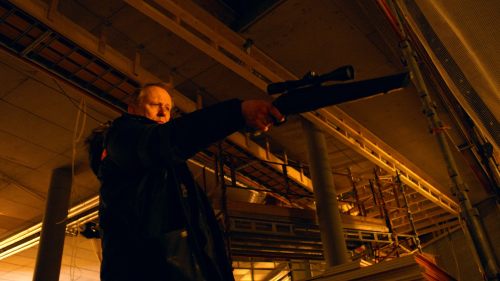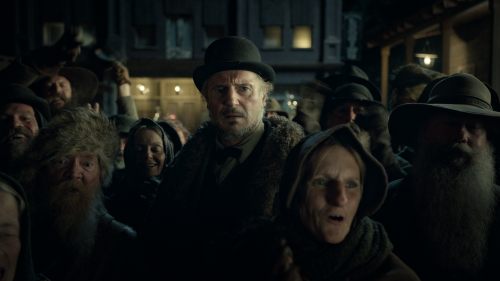COLD PURSUIT Review: Revisionist Revenge, Remade
I kept laughing throughout the trenchantly funny and vividly brutal Cold Pursuit, in which Liam Neeson plays a Regular Joe who scythes his way through a whole gang of drug dealers, but not with the sort of gleeful guffaws elicited by Game Night. More like barking, guttural, single outbursts, the sort of laughs that wrap around disbelief or revulsion. Cold Pursuit isn’t “ha ha” funny so much as “do bodies really make that sound when you break them?” funny.
Films in Neeson’s late-stage reinvention as a grimly-capable man of action, beginning with his leading role in the revenge thriller Taken, are as ridiculous as they can be entertaining. The creators of Cold Pursuit know this. That self-awareness gives their endeavor an advantage over all the other similar films Neeson has made in the past decade; this is both a new “Liam Neeson kicks ass” movie and a commentary on the absurdity of that entire construct.
Cold Pursuit is a remake of the 2014 Norwegian thriller In Order of Disappearance. It’s from the same director, Hans Petter Moland, who replicates many shots, and even entire sequences from his earlier film. It hinges on the same story, of Nels Coxman (Neeson), a snowplow driver who goes on a vengeful rampage against drug dealers after his son is murdered, with almost exactly the same beats and wry concepts. As in the first version, each death is marked by a black screen bearing the character’s name and a symbol of their religious leaning. The scripts for the two films (this one by Frank Baldwin, based on the Norwegian script by Kim Fupz Aakeson) are so close that one could be a slightly smudged carbon copy of the other.
And yet Moland’s remake efforts support the idea that even small changes can have significant impact. For all that Cold Pursuit is essentially the same movie as In Order of Disappearance, bringing Neeson into a role that always seemed meant for him in the first place pushes the story into a meaningfully different space.
Cold Pursuit is a revisionist Western cut from the same mold as Unforgiven — if not quite created of the same quality. The action is transposed to a small Colorado resort town just outside Denver. Wild West iconography — cowboys, horses, the open range — crops up frequently, and in unusual places like the entrance to a neon-colored rave.
Moland’s storytelling is visibly pushed towards a studio style — it’s more broad, more flashy than his first take on this story. The lighting from In Order of Disappearance is flat by comparison. Many locations are pushed to the edge of believability, from the Lynchian Denver morgue where Coxman’s son rests to his family’s perfect home. The graveyard in which multiple characters are buried is situated so precisely at the base of a mountain that it could have been laid out for a postcard, or a John Ford movie. This is all on purpose.
The setting is notably the Colorado of now, in which weed is legal. An eager new cop (Emmy Rossum) who is ready to bust heads finds that she’s got to go easy on ski slope stoners. Seems like law enforcement is pretty tuned-out in general, because Neeson’s Coxman never really has to worry about the cops, even as his body count climbs.
Cold Pursuit is more focused on cycles of violence than any system of man-made law and order. The murder of Coxman’s son is only one event. The plowman’s new nemesis, a drug lord called Viking (Tom Bateman), is father to a young boy who takes in his dad’s dirty dealings with wide eyes. Viking himself is trying —“flailing” might be a better word — to live up to his father’s gangland example. Coxman’s brother (William Forsythe) was even a gangster, nicknamed Wingman, and his past —combined with his marriage to the materially-obsessed Ahn, played by Elizabeth Thai — demonstrates that even this small town nice guy is part of a violent cycle.
The point is that no one is innocent, and evil comes from somewhere immediately up the family chain, and might extend back through generations of conflict. Evading the inheritance of that legacy is all but impossible. This extends to Neeson’s character, about whom the film creates no heroic allusions.
The most significant change from In Order of Disappearance is also the most interesting. Viking’s gang is rivaled by a group of Native American drug dealers. (In the original film, they were Serbian.) Frank Baldwin’s script gives equal time to a wide array of characters, and this gang benefits the most from his attention. Their leader, White Bull, played terrifically by Tom Jackson, is constantly reminded of his culture’s low standing in America, but that awareness is not used to justify or excuse his gruesomely violent criminal actions.
The sort of patient character building that makes room for White Bull is the warm core of Cold Pursuit’s frozen moral waste. When White Bull’s crew heads to Coxman’s resort town, they frolic in the snow in a way that reminded me of the beached gangsters in Takeshi Kitano’s Sonatine. Viking’s son deflects his father’s idiotic parenting with practiced skill. Two gangsters indulge an illicit relationship that could doom them. Their asides all add weight to the frenzy of violence that touches all the characters.
This is a movie about men and the violence they create for themselves, but Moland doesn’t push women to the margins. Though Emmy Rossum’s detective storyline feels like it has a part or two missing, her character is not exempted from the consequences of her actions. As Viking’s ex-wife Aya, Julia Jones infuses her role with a take-no-shit determination that leads to one of the film’s best payoffs. Laura Dern, meanwhile, plays Coxman’s wife Grace, and at first seems vastly underused. With only a few scenes, she disappears from the film far too soon. But her actions — and those of Aya and Ahn — ultimately define Cold Pursuit. While Nels Coxman rushes headlong into a bloody battle, Grace does the only sensible thing: she gets the hell out.



